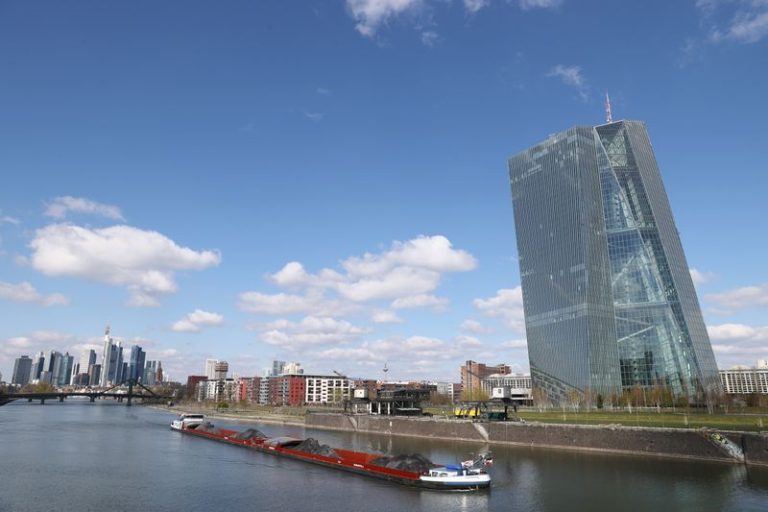© Reuters. FILE PHOTO: Maersk containers are stored at Zona Franca in Barcelona, Spain, November 3, 2022. REUTERS/Albert Gea/File Photo
By Siddharth Cavale and Josephine Mason
NEW YORK/LONDON (Reuters) – Lean times faced by many U.S. and European companies may last longer than expected as they try to sell off their bulging inventories in an economic climate where demand is stalling.
Full-to-bursting warehouses means fewer orders for manufacturers, which translates into lower levels of business activity and, ultimately, weaker growth.
The high stock levels are the result of retailers, wholesalers and manufacturers stockpiling everything from beer to DIY tools, chemicals and clothes as COVID-19 lockdowns snarled supply chains and shut factories.
They stocked up again after Russia’s invasion of Ukraine pushed up the price of raw materials such as energy and wheat.
Now, global demand is falling as borrowing costs have risen, so companies have started running down stocks. But the process has been much slower than expected and may drag into next year.
Maersk CEO Vincent Clerc said the company, one of the world’s biggest container shippers, was caught off-guard by how long it was taking businesses to cut inventory.
“We had expected customers to draw down inventories around the middle of the year, but so far we see no signs of that happening. It may happen at the beginning of next year,” he said at a recent media briefing.
Maersk controls about one-sixth of global container trade, transporting goods for a host of major retailers and consumer goods companies.
A review of corporate statements and briefings shows more than 30 U.S. and European companies, including Hugo Boss, Heineken (OTC:) and A.P. Moller-Maersk, 3M Co and Stanley Black & Decker (NYSE:) complained that destocking hurt their second-quarter performance.
Retailers particularly have struggled with stocks of clothing and footwear as consumers splurge on holidays rather than goods as they did during pandemic lockdowns.
The downbeat outlook comes amid low expectations for second-quarter results as China’s post-pandemic recovery slows. Refinitiv I/B/E/S data shows U.S. and European companies are expected to report their worst quarterly results in years.
RECORD HOARDING
Companies which stockpiled last year are finding it harder to shed inventories when higher borrowing costs and inflation crimp consumer demand, corporate executives and analysts said.
In the euro zone, stocks of finished products hit records in August last year and destocking only started in May, based on latest euro-zone manufacturing data.
In the U.S., an analysis of U.S. Bureau of Labor Statistics by CFRA Research showed business inventories soared by 20% in mid-2022, the biggest jump on record based on data that goes back to 1993.
Retailers led the trend – raising inventories by a quarter from a year earlier.
Some companies, including BASF, Levi Strauss (NYSE:) and Holcim (SIX:), have said the worst is behind them, based on recent comments from executives.
For London-listed Coats Group, which makes thread and yarn, things are improving, but the destocking has been deeper and lasted longer than usual.
CEO Rajiv Sharma was looking forward to a burst in orders once customers emptied their warehouses, but he said during an analyst call on Aug. 1 he couldn’t predict the timing and scale of that recovery until the fourth quarter.
Shops are being careful not to load up again, but Arun Sundaram, vice president of equity research at CFRA Research, said he is worried about demand heading into the U.S. holiday season.
“Excess savings that consumers have built since the pandemic began are draining, and we think all of these excess savings could be depleted by year-end or early next year.”
Parul Jain, finance and economics professor at Rutgers University, reckons the problem might have got worse in the United States, not better.
The U.S. inventory-to-sales ratio was 1.4 in May, up from 1.33 a year ago, which means retailers, manufacturers and wholesalers have more inventory than they can sell at a higher rate than a year ago, she said.
Guillermo Novo, chair and CEO of U.S. ingredients company Ashland (NYSE:), said hopes destocking would be over by end-June was overly optimistic.
“Until the inventory-control actions taken by our customers have subsided, it will remain difficult for us to gauge current near-term end-market demand,” he said in a statement on July 25.
Cyrus de la Rubia, chief economist at Hamburg Commercial Bank, doesn’t expect restocking to start until 2024.
“Until then, there are some lean times ahead.”
Read the full article here







